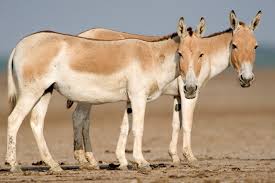(单词翻译:单击)
听力文本
Grass clings to life even as desiccating winds remove what little moisture remains in the soil.
即使风把土壤中仅存的水分带走,草也能存活下来。
So long as grass can survive, so can grazers.
只要草能够活下来,食草动物也能活下来。
Wild ass. The males are fighting to win territories.
藏野驴。雄驴在争夺领地。
Those that hold the best are more likely to attract a herd of females.
最有实力的也最有可能得到雌驴的青睐。
It's a frisky business. That counts as a victory,
其实是闹着玩的。那样算是胜了,
but he can't assume the females will actually turn up.
但却没有看到雌驴的出现
Female asses are mysterious creatures.
雌野驴是一种神秘的动物。

They come and go as they please and much of their behaviour seems unfathomable to an outsider.
随兴而来随兴而去,对于外人来说,这些雌驴的脾性好像是不可捉摸的。
They're the great nomads of the plateau
它们是高原上的伟大游牧民族,
and will often trek vast distances across these parched plains in search of oases.
为了寻找绿洲,其足迹早己遍布整个西藏高原。
But when they do find paradise,
当这些野驴真地找到了新的天地,
they are liable to feed and drink for just a few hours and then head back to the dust for no apparent reason.
饮水的饮水,吃草的吃草,个个毫无留恋之情,数小时后就绝尘而去。
视频及简介
剧组将镜头对准惊恐的蒙古小羚羊,亲眼目睹它们的季节迁徙的人其实很少。同时你不会错过第一次出现在摄影机镜头里的长相怪异的藏狐。历时六个星期,剧组为了跟踪一个企图捕杀大象的狮群,用夜视镜近距离地拍下了当时混战的场面。


